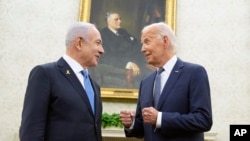U.S. President Joe Biden spoke with Israeli Prime Minister Benjamin Netanyahu Wednesday as Israel continues its military operations in Gaza and Lebanon and considers a response to recent Iranian missile attacks.
The phone call was their first conversation since August 21. The White House says Vice President Kamala Harris joined the call.
Netanyahu has been considering how to respond after Iran on October 1 fired about 200 ballistic missiles at Israel in a major escalation of a year-long conflict between Israel and Iran's regional armed proxies.
Biden has said he would not support an Israeli strike on Iran’s nuclear sites.
Meanwhile, Palestinian health officials said Wednesday that Israeli strikes overnight in northern and central Gaza killed at least 18 people.
The strikes hit the Nuseirat and Bureij refugee camps in the central part of the Gaza Strip, as well as the Jabaliya refugee camp in northern Gaza.
Israel’s military said Wednesday it carried out air and ground attacks in Gaza targeting Hamas militants.
The fighting and repeated Israeli evacuation orders have left Palestinian civilians with nowhere to go, the United Nations said.
Philippe Lazzarini, the head of the U.N. Palestinian refugee Agency (UNRWA), said on X that at least 400,000 people are trapped in northern Gaza.
Lazzarini said many people are refusing to follow evacuation orders “because they know too well that no place anywhere in Gaza is safe.”
“With almost no basic supplies available, hunger is spreading and deepening again,” he said.
The Israeli military also conducted new air and ground operations Wednesday targeting Hezbollah militants in southern Lebanon, and it said three of its personnel were injured in combat Tuesday and Wednesday.
Air raid sirens sounded in northern Israel as Hezbollah fired artillery and rockets across the border.
Prime Minister Netanyahu said Tuesday that his country’s military has killed the presumed successor to Hezbollah leader Hassan Nasrallah, who was killed in an Israeli attack in Beirut on September 27.
Hashem Safieddine was Nasrallah’s cousin and a senior official in the organization and expected to replace him. He has not been heard from since last week, when Israel launched a series of intense air strikes on the Beirut suburb that is Hezbollah’s stronghold.
"We've degraded Hezbollah's capabilities,” Netanyahu said in a video message addressed to “the people of Lebanon.”
“We took out thousands of terrorists, including Nasrallah himself and Nasrallah's replacement and the replacement of the replacement."
There was no immediate response from Hezbollah, which usually confirms the deaths of its top people.
Netanyahu said Israel will “do whatever is necessary to return our people safely to their homes” in the north of the country, where they have been subjected to Hezbollah rocket fire since October 8, 2024. At least 49 people have been killed on the Israeli side of the border in the past year. More than 500 were killed on the Lebanese side during the same period.
“Israel has a right to defend itself. Israel also has a right to win! And Israel will win!” the prime minister said.
The war in Gaza began with the October 7, 2023, Hamas terror attack that killed about 1,200 people in southern Israel. They also took about 250 people hostage, with around 100 still being held and about one-third of those believed to be dead.
Israel’s military campaign of air and ground attacks in Gaza has killed more than 42,000 Palestinians and wounded more than 97,700, according to the Gaza Health Ministry. The ministry does not differentiate between militants and civilians, but has said just more than half were women and children.
Both Hamas and Hezbollah have been designated terrorist organizations by the United States, United Kingdom, European Union, Israel and others.
VOA U.N. correspondent Margaret Besheer and VOA reporter Natasha Mozgovaya contributed to this report. Some information for this story was provided by The Associated Press, Agence France-Presse and Reuters.





Forum